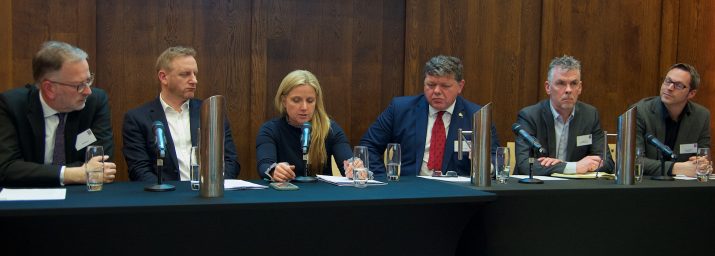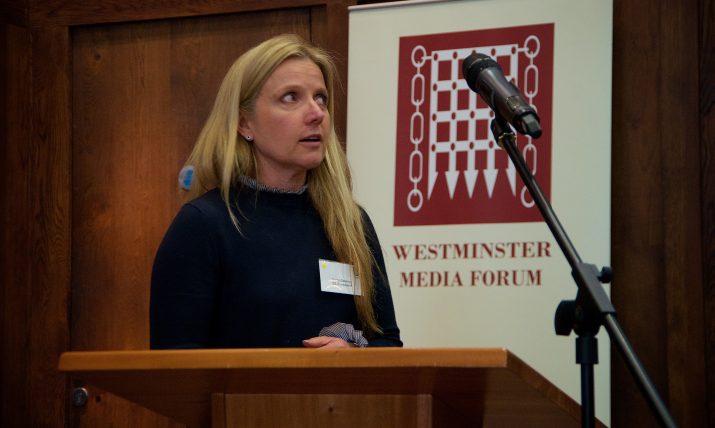Westminster Media Forum: Balancing pay-TV against free-to-air for sports
It can be difficult for free-to-air (FTA) broadcasters to compete for sporting rights with the big pay-TV and streaming companies, which is why many countries legislate that some of the biggest events should be available FTA, a topic that inspired considerable debate at the recent Westminster Media Forum policy conference on sports broadcasting in London.
In the UK, listed events that have “national resonance” must be offered to FTA broadcasters on “fair and reasonable terms”. Group A, granted live coverage, includes: Olympics, World Cup, European Cup, Scottish and English FA Cup finals, Grand National and Derby, Wimbledon (finals), Rugby League Challenge Cup final and Rugby World Cup final. The Paralympics has recently been added. Group B is highlights only, including such events as the rugby Six Nations. Other countries, such as France and Australia, have something similar.
According to Ed Warner, chair of World Para Athletics for the International Paralympic Committee and future chair of Great Britain Wheelchair Rugby, this list is “an incredible anachronism” (it was drawn up in 1956), however, he admits that not being free-to-air can impact a sport negatively, as seen with cricket, which has declining viewing and participation figures since going subscription only, although revenues have risen.

Left to right: Ed Warner, Alan Gilpin, Vicky Gosling (speaking), Lord Addington (chair – VP, UK Sports Association), Nigel Hill and Pete Andrews
The importance of FTA was shown in 2016, when the BBC said it broadcast “only 3% of all the sport on UK TV, but it had 44% audience share.”
Sky broadcast almost 50% of sport in 2016, with a market share less than half that of the BBC. Of course, that was an Olympic and football Euros year, so the BBC had major listed events.
“The listed events structure doesn’t really exist to serve the public. It feels to me as though it increasingly exists to serve the BBC itself – to give it some protection for its sporting output – and it exists mainly to protect sporting bodies from shooting themselves in the foot,” added Warner.
Warner was chair of UK Athletics, which wouldn’t have gone anywhere but the BBC, “because we didn’t have the pulling power of Premier League football or Six Nations rugby. Sponsors were only interested in the fact that you could get one-and-a-half or two million viewers watching our events on the BBC.”
He suspects viewing figures would have been a tenth of that on a subscription channel. “If we want to protect certain events for the good of society, then they should be minority sports that need promotion, security and protection, otherwise let the governing bodies do what they wish.” If they make the decisions cricket has made, “they live or die by the consequences.”
In a lot of the world “we’re a niche sport and need that broadcast platform to grow,” said Alan Gilpin, chief operating officer and head of Rugby World Cup, World Rugby. “There is that balance in growing the global game between revenue generation and exposure,” which is particularly important for its biggest events.
Rugby World Cup produces the vast majority of its revenue, and generated the five biggest audiences of all time for rugby (all through FTA broadcasts in Japan, where it was on two FTA broadcasters as well as on pay-TV, garnering 55m for the Japan-Scotland match), while, in the UK, it won the biggest sporting audience of 2019 for ITV for the final (12.8m).
“The listed events structure doesn’t really exist to serve the public. It feels to me as though it increasingly exists to serve the BBC itself” – Ed Warner
He would prefer that a “responsible governing body” like WR could make the choice between FTA and subscription rather than being subject to legislation. One challenge is that “free-to-air broadcasters simply don’t have the ability to schedule all of the content we can produce,” in a 48-match tournament, “so you need a mix of broadcasters.”
Many sports get funding from the National Lottery or UK Sport, and Warner believes: “There is an imperative on the government to ensure that if public money goes in to an event or person, that the public gets a chance to watch that event or person competing free to air.”
“Because a lot of our funding comes from the Lottery, about 90%, [listing] is difficult to argue against,” added Vicky Gosling, chief executive officer, GB Snowsport.
Warner believes listing is now outdated. Perhaps all these events should be on the B List, for highlights. However, “I don’t think any of the owners of rights of the events on the A List at the moment are going to want to see them go behind a paywall. So, the list should be scrapped and if there is any list it should be about protection of sports that we’re trying for societal reasons to promote, such as the Paralympics or Women’s FA Cup football.”
FTA and pay-TV working together
Getting the Paralympics listed has been good for Channel 4, which broadcasts it in the UK. “It’s hugely important for us. It’s channel defining,” said Pete Andrews, its Head of Sport. “It’s always the biggest thing we do when we do it, and I think it’s the favourite of everyone to work on.”
However, FTA and pay-TV needn’t be rivals. Channel 4 worked with Sky Sports on the Cricket World Cup last year “to make sure that this amazing event, a World Cup final on home soil with England in it, was free for everybody to watch,” said Andrews. However, “allowing someone else’s coverage on your channel is a huge thing, if you’re a channel like Channel 4 and your editorial is so important,” given its identity is “to do things differently,” but it felt it was worth it.
“It allowed us to share an amazing event.” The reach for the tournament was increased by 11.2m. “If something like that had gone under the radar, it would have been a missed opportunity for cricket.” He believes it also worked for Sky Sports in showcasing what it offered, especially with an Ashes series following after.
It has also just renewed a partnership with Sky Sports to do Formula One, with regular highlights shows. Although Sky has almost all of the races live, exclusively, the British Grand Prix is also live on C4, which Andrews believes is good for attracting a wider audience that might then be persuaded to subscribe to Sky for further coverage – with C4 bringing in 17m viewers in an overall total of 28.9m. “When you can get people sitting together watching great sport that’s how you get the next generation of sports people and viewers, and indeed subscribers.”
The F1 partnership began for a year, and has been renewed for a longer term, which only happens “if it’s working for everyone,” he said. F1 management “is very keen that Formula One doesn’t disappear from the psyche of the free-to-air viewer,” and this interest helps keep the British Grand Prix (not a listed event) alive.
“Those partnerships are ever more important now in getting the maximum coverage for an event, or a season or series of sports content, because very few broadcasters have got the scheduling bandwidth to tell the whole story,” added Gilpin. He thinks it will be “an increasingly important part of broadcast rights” in future.
Commercial realities
“The one thing that we have that is valuable is our content. Given that resource funding is limited, what you find is that you are competing in that space,” not just with other sports but within the sport itself, said Gosling.
Potential competitors for resources include athletes doing their own content and the international

GB Snowsport’s Vicky Gosling speaking at the Westminster Media Forum
organisations above the national bodies. “In quite a lot of sports, the elite athletes are on social media and have their own profiles and can capture their own content,” said Nigel Hill, Commercial Director, British Gymnastics. “Part of our role is ‘how do we work with those athletes as well?’ – whether that’s a revenue share,” or just hoping it all promotes the sport.
“In the finite pool of broadcast dollars,” national governing bodies “are often in a very weak position relative to international federations […] and the athletes themselves,” said Warner. NGBs often expend a lot of money getting teams to the Olympics, but gain very little for themselves. Most NGBs “teeter on the edge of financial difficulty on a continuous basis.”
Gilpin added that broadcasters sometimes object that what NGBs and individual players do can dilute their exclusivity, but he believes there could be “a better partnership here. The more people, in France for example, that are accessing quite cool content the French team are creating at their training camp is actually going to drive more viewers to their live coverage, which is the bit they’re really monetising,” and this applies equally to content sponsors might create.
Because the Rugby World Cup only happens every four years and drives the vast majority of World Rugby’s income, its NGBs are encouraged to use the opportunity to increase their own income off the back of it, because it benefits all the game.
“Anything that amplifies the event that is coming up on our channel is great,” said Andrews. “Let’s all work together to bring the biggest audience to the event. Being really collaborative is the right way forward.”
“Exposure is absolutely key as we’re growing the sport, but we want to find a combination where we can generate revenue from free-to-air and other sources as well,” said Gosling.
The Westminster Media Forum: ‘The future of UK sports broadcasting’ took place on 11 February 2020 in London

